Uncategorized
A Tribute to Sally Buckwalter from Schreiber President James DeBord
April 5, 2024I was saddened last week to learn of the passing of a wonderful friend of Schreiber Mrs. Sally Buckwalter. If ever there was a person who personified kindness, generosity and a deep sense of human decency, actively demonstrated to others throughout her life it was Sally Buckwalter.
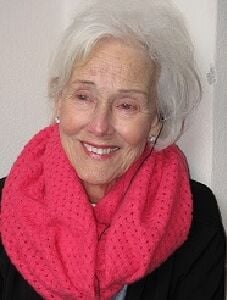
In my 12 years here at Schreiber there is a list of people who have helped bring transformational change to this amazing place and Sally’s name is near the very top of that list. As an active engaged philanthropist with a full schedule connecting her to many amazing non-profit causes in our community Sally was never too busy to take the time to come visit Schreiber and let us share with her our latest vision or plans. From the building of a dedicated Infant Care Room, allowing us to provide childcare services to children as young as six weeks old to building a new, higher portico that would no longer be damaged by regular strikes from transport busses or delivery trucks, regularly putting our main entryway out of commission, Sally quietly came forward to make it possible. She never wanted recognition for her efforts, just the satisfaction of knowing things would be made better for the thousands of children and their families who we serve.
More recently, while still battling the challenges caused by COVID in early 2021, I had a long phone call with Sally telling her of the need to create more therapy space for our growing number of staff and the increased numbers of children they would need to see again in person once the pandemic restrictions were eased. Without hesitation Sally’s reply was to say, “Please just let me know what you need and we’ll help get this project going.” It was a classic Sally moment where she didn’t ask for elaborate details or create a lot of hoops to jump through, she quite simply just always helped to get things done. She remarked to me one time, “I see all the good that is done here at Schreiber, so if I can help build on that then I’m happy to be a part.” As a result of her very early support, Schreiber is in the process of completing the largest expansion and renovation in our nearly 90 year history. This project stands as a testament to Sally and her caring for others.
For all the kindness and generosity she showed to so many and the lives she helped to change for the better now and long into the future, I along with everyone here at Schreiber will remain eternally grateful for the wonderful life of Sally Buckwalter. We hope that these words will serve as a comfort to her family and friends as they recall her truly amazing life.
– James DeBord
As a nationally recognized pediatric facility, the Schreiber Center for Pediatric Development provides family-centered education and therapy programs for infants, children and adolescents with disabilities, developmental delays, and acquired injuries. Our goal-oriented approach maximizes each child’s ability to function independently within the community.
General Monthly eNewsletter Sign Up
Sign up to receive monthly newsletters to your email box to learn more about what is going on at the Schreiber Center, and how you can help support our mission to help every child in need reach their fullest potential.
How Schreiber Transformed Our Son’s Feeding Challenges: A Personal Testimonial
January 30, 2024Written by: Schreiber Client Finn’s Mom, Danielle Gwilt
Our son Finn was diagnosed with food allergies shortly after his first birthday, and a chronic digestive condition called Eosinophilic Esophagitis (EoE) about a year after that. Due to allergies and discomfort due to EoE, feeding Finn was a challenge pretty quickly after he began solid foods. He was incredibly reluctant to try or even touch new foods or drinks. Finn started occupational therapy, prior to coming to Schreiber, at 18 months for these feeding aversions and sensory issues. While this initial round of OT helped us to learn about Finn’s sensory needs, we made no progress at all with his eating and decided to stop the therapy. We were then referred to a speech therapist outside of the Schreiber Center to see if they could help. After about a year of visits with them, while Finn had made minor progress, they felt we didn’t have anything new to try and we were discharged from their care.
During a visit with his nutritionist around Finn’s third birthday we were discussing his ongoing feeding issues and she recommended that we reach out to the Schreiber Center for Pediatric Development. She recommended we try to see Sarah Terry specifically if she was available, as she had heard Sarah was especially good with strong-willed, picky eaters. We quickly realized how right she was! A few months after Finn turned 3 we had our evaluation and acceptance into Schreiber’s OT program, and were lucky enough to get a slot in Sarah’s schedule.
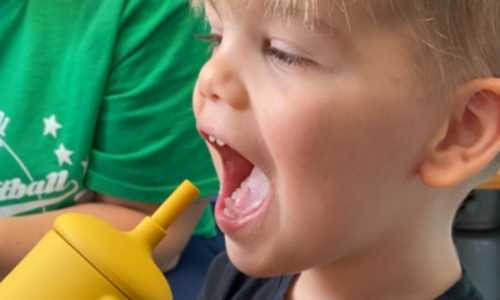
At the time of our admission, Finn (3 years old) was drinking from a bottle only, would only drink oat milk, and refused every type of cup offered. He was only eating 8-10 foods with regularity. He was also still eating baby food purees every day as one of his main foods. Our initial goals with Schreiber were to get Finn to try new foods, add new foods into his diet as regularly accepted foods, and to drink out of anything other than a bottle.
Initially, Finn was very reluctant to attending therapy, likely because he had been through other programs. What Schreiber offers is so different from anywhere else we had been. Schreiber allows for kids to make their own choices (toys they want to play with, a certain apparatus they may want to try, etc.) while still working toward the child’s goals and setting clear boundaries. Finn quickly warmed up to Schreiber and to Sarah due to the fun atmosphere and the incredible patience and understanding she showed while working with us. Sarah employed a wide array of play-based OT to entice Finn to try new foods. He was able to get the needed sensory input to his body by jumping and climbing in the large OT room before moving to a smaller room for therapy. Sarah would spend time playing with toys, games, painting, etc. in exchange for Finn touching, playing with, and eventually tasting the new foods.

Sarah took the time to get to know Finn and his interests and form a true relationship with him. She made his appointments fun and silly, all while working towards his goals. She was never visibly frustrated with him, even through some incredibly frustrating visits where he would flat-out refuse to cooperate. And she celebrated each win with us – no matter how small. Her positive and good-natured attitude made returning each week a pleasure, rather than the chore that therapy can often feel like. Sarah gave us suggestions on foods to try, ways to make slight alterations to foods to get him to accept new things, and a ton of tools to use at home as well.
We’d be remiss if we didn’t also mention Lisa at the front desk! She always welcomed our family with a smile and would greet Finn by name within just a few short weeks of his attending Schreiber. She truly assists in making Schreiber feel welcoming from the time you walk in the front door.
The progress Finn made through our time at Schreiber is truly remarkable. His willingness to try new foods, and to try foods more than once, has grown exponentially. He has a much larger catalog of widely accepted foods he’ll eat on a routine basis. He no longer drinks out of a bottle and will drink more than just one type of drink.

There are no words to express how much Schreiber positively impacted our lives. We are forever grateful to Sarah and the team at Schreiber for all they did for us and would highly recommend them to anyone whose child needs assistance!
Help Schreiber Clients like Finn receive the care they need, consider donating in support of our Kids’ Care Fund, a long and short term savings account used to cover the costs of uncompensated care.
As a nationally recognized pediatric facility, the Schreiber Center for Pediatric Development provides family-centered education and therapy programs for infants, children and adolescents with disabilities, developmental delays, and acquired injuries. Our goal-oriented approach maximizes each child’s ability to function independently within the community.
Small Victories Creating Big Impacts for the Morales Family
January 8, 2024Teresa, the youngest, and fifth of the Morales children to receive pediatric therapy services here at the Schreiber Center faced hurdles with her speech and fine motor skills. Her parents, already familiar with the impact of our services, turned to Schreiber again, in the hopes that we could help Teresa savor the simple joys of childhood and build the tools necessary to succeed in adulthood.

Early life for Teresa felt like a puzzle missing crucial pieces. Her toys requiring nimble fingers laid untouched, and words escaped her, leaving her frustrated and easily overwhelmed. Family outings felt more like survival missions than moments to cherish.
Following Early Intervention services, Evelyn brought Teresa to Schreiber where she embarked on a journey to unravel her potential. With each session, her therapists Maddy, Camilla, and later Sarah weren’t just guiding her through exercises, but rather sculpting experiences tailored to Teresa’s interests. Sensory integration was a cornerstone to her sessions, weaving therapy tasks with activities specifically designed to help balance her sensory needs and help her focus on her therapy tasks. It was in these moments that she found the balance she needed to thrive.
Now, Sarah and Maddy skillfully maintain Teresa’s focus during therapy by introducing captivating games and activities tailored to her interests. By aligning tasks with her current preferences, they’ve witnessed incredible strides. Teresa’s artistic abilities have flourished, delighting her mother, who proudly exclaims, “She can draw a person now!” This achievement stands as a monumental step for Teresa, considering her past aversion to crayons due to sensory issues.
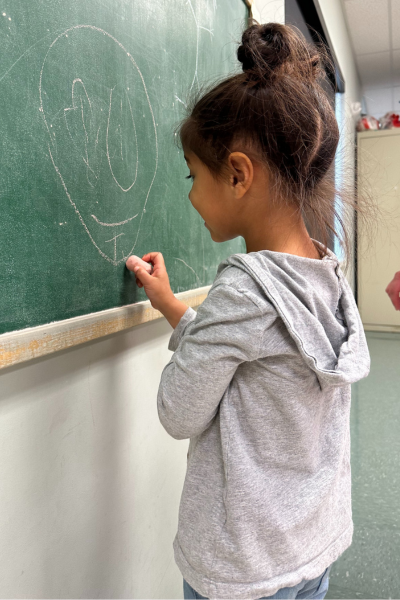
Her therapists have each provided the family with strategies to support her progress at home. As a result, the entire household now actively engages in sensory activities and verbal interactions. Evelyn shares that “I’m overstimulated” has become a familiar phrase in their home which serves as a unique tool for the family, helping them not only acknowledge their individual thresholds but also establish personal boundaries within the household.
Aside from engaging in sensory exercises at home, the family actively aids Teresa’s language development. Through guidance from Maddy, they’ve discovered that avoiding direct questions like “What color is this?” in favor of options like “Would you like to color this blue?” and allowing Teresa to express her choice by finding the specific color she prefers is a more effective learning approach for her.
Gaining confidence in her language abilities has empowered Teresa to voice her desires and needs effectively. Her newfound skills in self-advocacy have transformed her life. Now attending a mainstream preschool, she joyfully engages with friends, relishing playtime in the make-believe kitchen. Teresa has evolved from merely trailing her friends and staying silent to being an active participant, engaging in reciprocal play and conversation. She’s even developed a fondness for family outings and group activities, enhancing not only her own experience but the collective enjoyment of her entire family.

Evelyn, having navigated the therapeutic journey with five of her children at the Schreiber Center, imparts a valuable lesson for families walking a similar path. Her wisdom encapsulates the essence of patience and cherishing the seemingly small victories. In her words, “Be patient. Appreciate the small things. Sometimes parents get too caught up in the big milestones and forget to celebrate the small improvements. It’s those small things that are a big deal and celebrating them helps keep your child motivated to keep working towards reaching the big goals.”
Help Schreiber Clients like Teresa receive the care they need, consider donating in support of our Kids’ Care Fund, a long and short term savings account used to cover the costs of uncompensated care.
As a nationally recognized pediatric facility, the Schreiber Center for Pediatric Development provides family-centered education and therapy programs for infants, children and adolescents with disabilities, developmental delays, and acquired injuries. Our goal-oriented approach maximizes each child’s ability to function independently within the community.
The GIANT Company’s $13,500 Gift Sparks Our Feeding Program into Action
October 23, 2023Thanks to the extraordinary generosity of The GIANT Company through their Make a Difference Challenge, we are thrilled to announce that our groundbreaking Feeding Program will soon be launched as an extension of the therapeutic interventions already in place and led by our dedicated interdisciplinary team of occupational and speech therapists.

Proper nutrition is vital for all children, but attaining that goal is often more difficult for children who may be on the autism spectrum, diagnosed with cerebral palsy, or facing various feeding-related issues, from food refusal to motor impairments. Over the years, our Feeding Program has ebbed and flowed, adjusting to the evolving needs of our clients. While our Feeding Program has shown remarkable results, we have faced challenges in securing consistent funding. Insurers have not always recognized the immense benefits of our interdisciplinary approach. To truly thrive, our Feeding Program requires a sustainable line of funding. Historically, we have encountered fluctuating reimbursement rates from insurers, impacting our ability to deliver vital services. As an organization committed to never turning a child away, regardless of a family’s financial means, we rely on philanthropic support to bridge the gap.
We are thrilled to announce that The GIANT Company’s remarkable gift of $13,500 will be a game-changer for our Feeding Program. This generous contribution will enable us to obtain the necessary supplies, family support resources, and continuing education required to sustain and expand this vital program. While our current occupational and speech therapists will collaborate through this Feeding Program to teach essential swallowing, eating, and feeding skills, it is our goal to use a portion of these funds to bring in a nutritionist as part of the team to ensuring that every child’s nutritional goals are met.
The profound impact of The GIANT Company’s generous $13,500 donation cannot be overstated. This invaluable contribution empowers us to make a meaningful difference in the lives of at least four families each year, invest in ongoing therapist education, and provide intensive feeding programs to both children and their devoted parents or guardians. The Schreiber Center for Pediatric Development extends its deepest gratitude to The GIANT Company for recognizing the critical importance of our Feeding Program. With their unwavering support, we are well-equipped to move forward in our mission of nurturing the potential of every child, regardless of the challenges they may face.
Donate today to help us create a lasting impact one nourishing meal at a time.
As a nationally recognized pediatric facility, the Schreiber Center for Pediatric Development provides family-centered education and therapy programs for infants, children and adolescents with disabilities, developmental delays, and acquired injuries. Our goal-oriented approach maximizes each child’s ability to function independently within the community.
The Challenges Of Being Deaf In A Hearing School
September 20, 2023School can be a difficult space for any child to navigate, but when you add the additional challenge of being deaf, the difficulties only grow. By shining a light on the unique challenges that children who are deaf encounter in school we hope to help minimize them.
The Communication Barrier: A Key Obstacle
One of the most significant challenge that Deaf children face in school is the communication barrier. This barrier extends beyond the classroom, affecting interactions with both peers and teachers. Deaf children often encounter difficulties in fully understanding and engaging with lessons due to limited access to auditory information. This, in turn, can lead to academic delays, as their access to information is restricted.
Furthermore, a lack of awareness and training among teachers about the specific needs of deaf children can increase these challenges. Without proper training, educators might struggle to adapt their teaching methods to accommodate different learning styles and communication preferences. The result is that the potential of deaf students may go unrecognized and underdeveloped.
Social Isolation and the Emotional Impact
Education is not just about gaining knowledge; it also shapes a person’s social development. For children who are deaf, this can be a double-edged sword. Limited communication opportunities can isolate them from their hearing peers, making it difficult to form friendships and engage in extracurricular activities, clubs, and sports. A traditional classroom settings might not provide the necessary environment for effective communication, which can lead to a sense of isolation.
The consequences of such isolation are significant. Deaf children may face bullying and teasing due to their differences, which can lead to emotional distress and lower self-esteem. The lack of social interaction can hinder their emotional well-being and overall growth.
Access to Support Services and Inclusive Education
Access to appropriate support services is necessary to help mitigate these challenges. Sign language interpreters and note-takers help ensure effective communication and learning for deaf students. However, these services are not always available or properly implemented in educational institutions.
Inclusive education, which ensures all students receive equitable opportunities for learning and participation, is a cornerstone for breaking down barriers. Creating an environment that fosters inclusivity goes beyond just providing services—it entails changing attitudes and practices, and embracing the unique perspectives and strengths that each student brings.
The Power of Sign Language
A key solution to bridging the communication gap lies in the widespread adoption of American Sign Language (ASL). ASL is not just a language; it’s a pathway to breaking down communication barriers and fostering understanding between deaf and hearing individuals. By promoting ASL as a fundamental skill, we can lay the groundwork for a more inclusive and supportive educational experience for deaf children.
Building an Inclusive Future
In celebration of the International Week of the Deaf, it’s crucial to remember that the challenges faced by deaf children in school are not insurmountable. Through appropriate accommodations, specialized support services, comprehensive teacher training, and the promotion of sign language, we can create an environment where all children, regardless of their hearing ability, have equal access to quality education and social integration.
If you child is Deaf and you are interested in learning more about how Schreiber’s Pediatric Therapies can help your child visit: http://www.schreiberpediatric.org/therapy-services/
As a nationally recognized pediatric facility, the Schreiber Center for Pediatric Development provides family-centered education and therapy programs for infants, children and adolescents with disabilities, developmental delays, and acquired injuries. Our goal-oriented approach maximizes each child’s ability to function independently within the community.
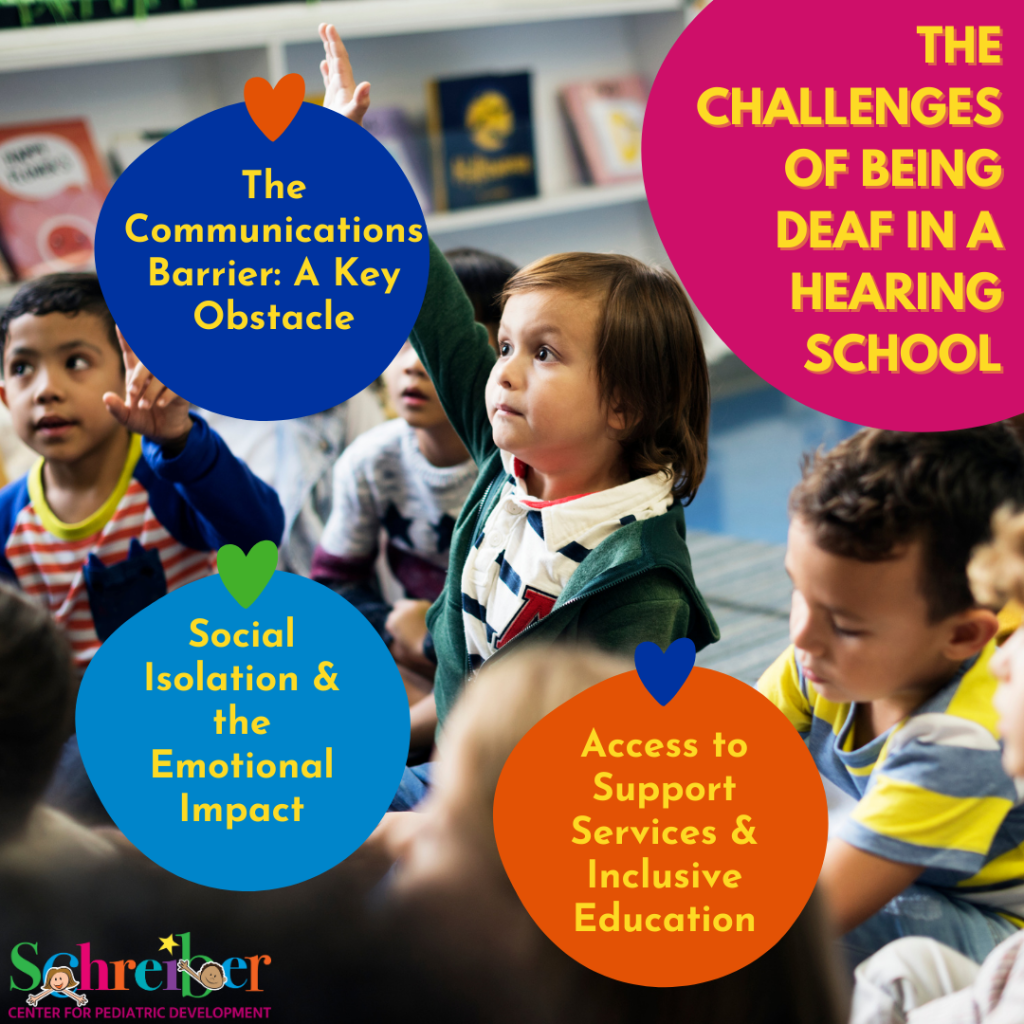
Deanna and Zoey learn to live with Rett
May 20, 2021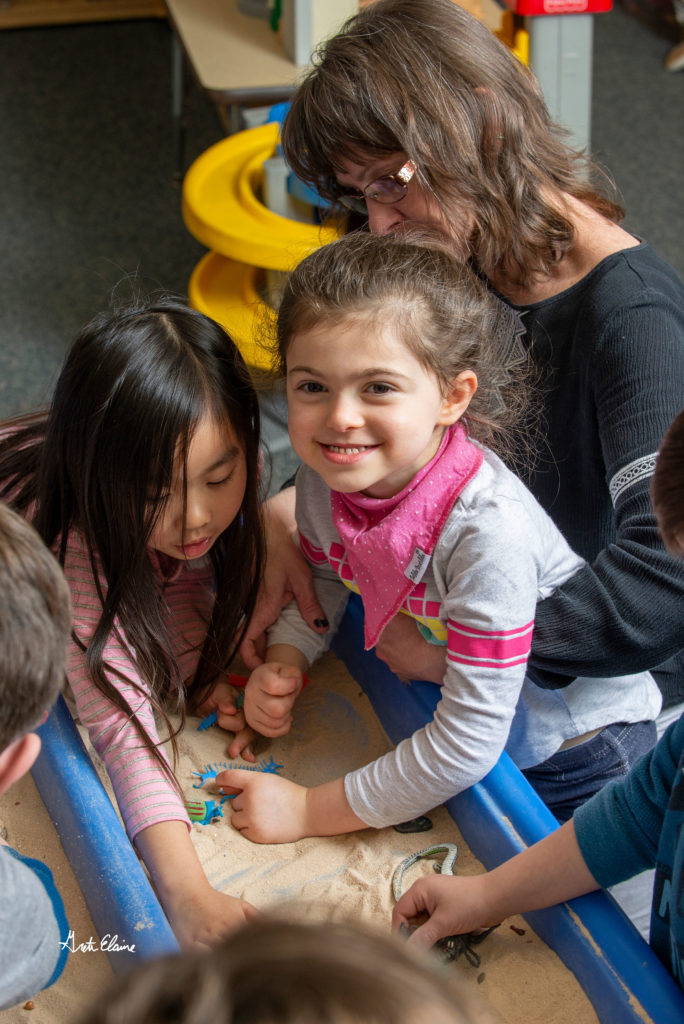
Zoey Adair
Zoey and some of her preschool friends play in a sandbox in a photo from 2019. Zoey has learned many different skills at Schreiber as she and her family deal with her diagnosis of Rett Syndrome, a rare genetic disorder.
Deanna Adair has been a Schreiber physical therapist for five years. Her daughter Zoey attended Schreiber’s S.T.A.R.S. preschool and Circle of Friends Academy and is now in kindergarten. Zoey also receives therapy services. She has Rett Syndrome, a rare neurological disorder affecting mostly girls. Individuals with Rett appear to develop normally until 6-18 months of age, after which they go through a regression and lose acquired skills. Zoey was diagnosed at 21 months of age. She began to display gross motor and language delays by 9-10 months of age, and began to lose her fine motor skills around 18 months.
Zoey, who will turn 7 in July, is unable to walk independently or talk, and has lost the ability to use her hands functionally or chew food. She communicates using an Eyegaze device and a yes/no board. She eats pureed foods and drinks thickened liquids, and has a feeding tube for supplemental hydration.
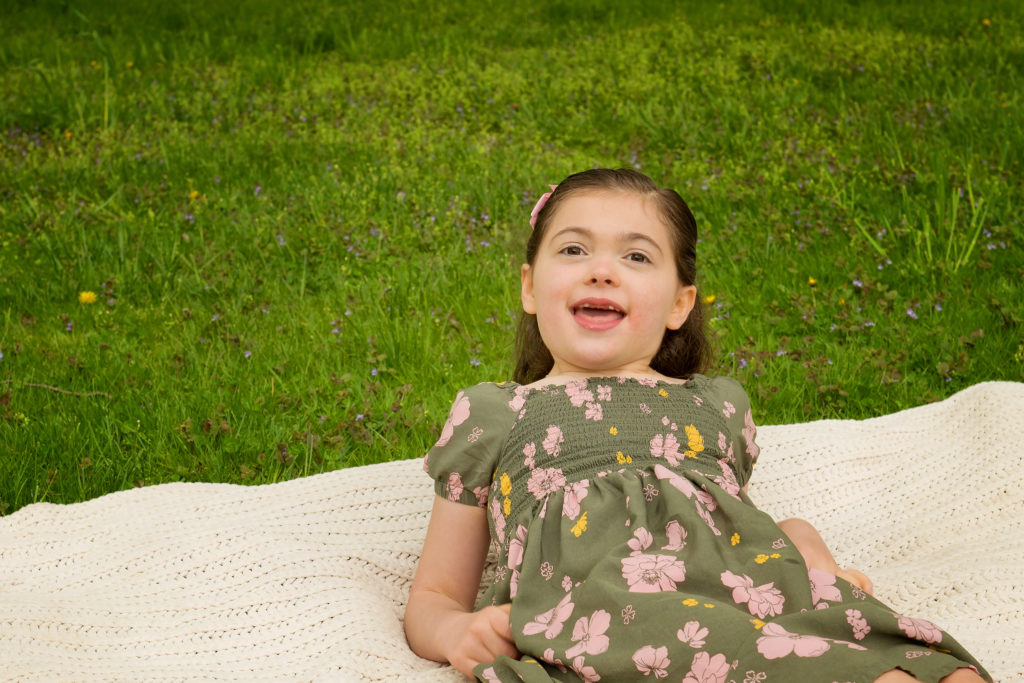
She also has scoliosis and obstructive sleep apnea, for which she uses a BIPAP machine. Rett Syndrome is not a degenerative disorder (brain cells are intact), and has been shown to be reversible in a lab setting, indicating that it may be curable in humans.
Deanna recently wrote a Facebook post to mark the fifth anniversary of Zoey’s diagnosis. She agreed to share it here.
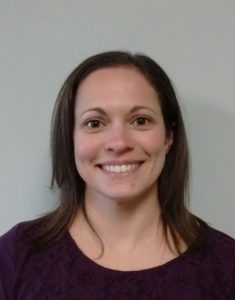
I can’t believe it’s been five years since we received Zoey’s Rett Syndrome diagnosis. It was Friday the 13th. I was on my way from my old job to pick her up from day care at Schreiber and answered the phone call as I was getting on the highway. I thought they were going to tell me that further testing was needed, because they only agreed to test for Rett “for peace of mind,” since I asked, but that’s not how it went. They gave us an appointment at the CHOP Rett clinic three days later and told me not to look it up on the internet. Guess what I spent the entire weekend doing?! After two days on the couch, I had to pick myself up and do what needed to be done for our girl. After all, she was the same sweet, beautiful little girl she had been before the diagnosis.
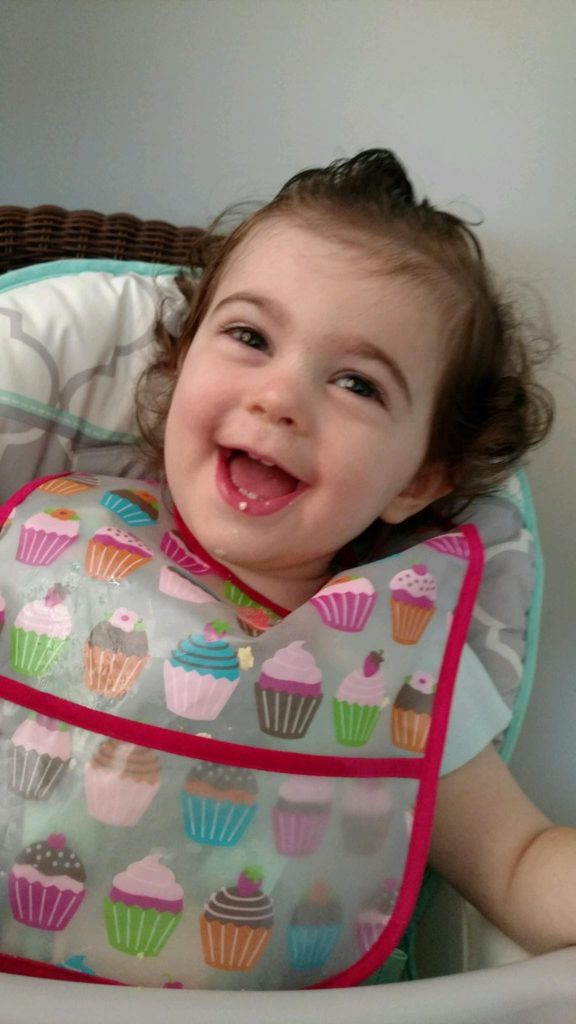
We have learned a lot since that day, and we are determined to give her the best life possible and find ways for her to learn and experience as much as she can. She is such a sweetheart, has a sense of humor, is smart, works hard, and is just a happy girl. Life has not been easy, and we have our tough times, but she is worth it!
Lately, we have been working on things like a special needs trust for her future, which can be overwhelming to think about, and the older she gets without there being a treatment or cure, the harder it is, too. But our girl has had an amazing year in kindergarten, having fun and learning to read and write using eye gaze, and we are so proud of her!
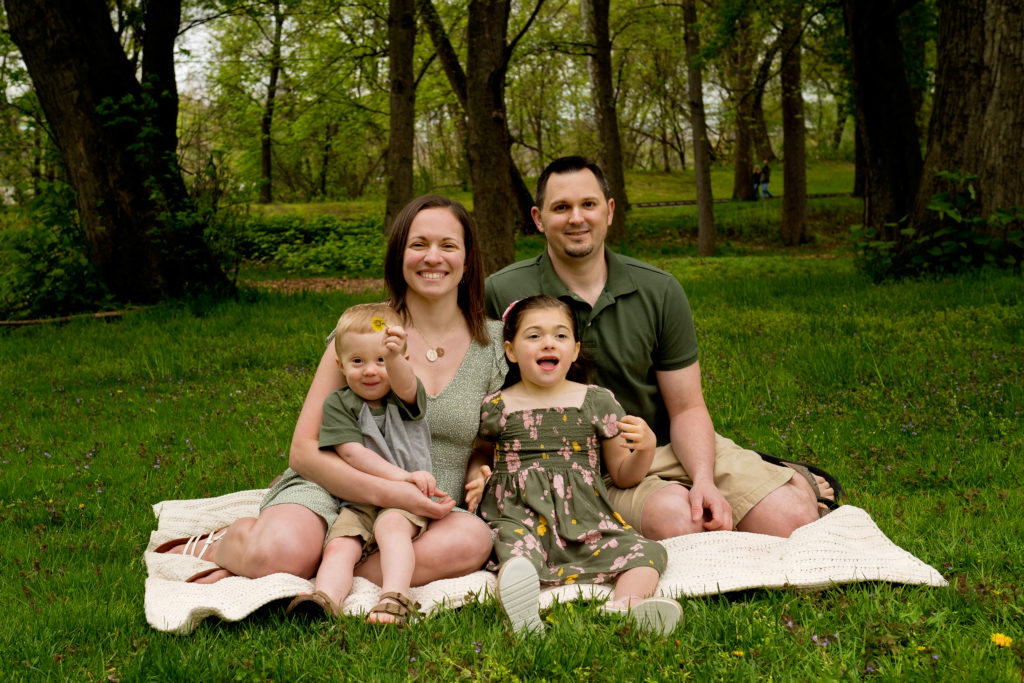
Penn State awards first Schreiber scholarship
May 11, 2021Anicia Anderson can trace her interest in a speech-language pathology career to hearing a guest speaker during a high school health class. She was in 10th grade at North Haven High School, a public high school in North Haven, Conn.
The speaker was looking for volunteers to come and work in a group home for older adults with autism. Anicia said she thought it sounded interesting, and she needed the community service hours, so she went.

“That was my first experience with people that were non-verbal,” said Anicia, thoughtful and gracious with her time during a recent phone interview. “That kind of geared my passion to wanting to work with people that have communication challenges.”
That first psychic nudge started her on a path toward a career she knew nothing about as a 15-year-old in the little town of North Haven (population about 25,000), a northern suburb of New Haven, home of Yale University.
Anicia received her bachelor’s degree from Penn State this spring and will begin pursuing a master’s degree there in speech-language pathology. She is the first recipient of the Schreiber Center for Pediatric Development Educational Equity Graduate Scholarship. The scholarship comes from a new fund established by Schreiber and Penn State to address the lack of diversity in the field of speech therapy.
“There’s not a lot of diversity in the field of speech-language pathology,” Anicia said. “Clinicians see clients from all different backgrounds and races and cultures. Inclusion is important: having a diverse clientele, having more diverse students entering the field, having more diversity among clinicians. I look forward to helping to make that change.”
Anicia didn’t know much about the scholarship or Schreiber before she was admitted into the grad program. “I’m in a diversity recruitment group, and I heard the name, but I didn’t really know what it was about.”
That soon changed. Dr. Diane Williams is a professor and department head in the Department of Communications Sciences and Disorders, where Anicia will continue her speech therapy studies. She approached Anicia about the scholarship.
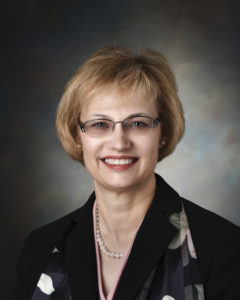
of the Department
of Communication Sciences
and Disorders at Penn State
“We chose Anicia because of her academic achievements,” Dr. Williams wrote in an email, “her strong letters of recommendation, her interest in working with children with complex communication needs like those served by the Schreiber Center, and because of her efforts around issues of diversity and inclusion.”
Dr. Williams joined a recent Schreiber board meeting to announce the first scholarship award. In her remarks, she thanked Schreiber’s leadership for its willingness to take a strong stand on increasing diversity, and for their good timing.
“When James (DeBord) reached out to us last year, the timing was just right,” Dr. Williams said. “My department had come together to make a commitment to work to increase diversity in the field of speech-language pathology. James’ offer to raise funds for a scholarship to support a student in speech-language pathology from a diverse background was such a generous one. We saw it as not only an opportunity to help us increase the diversity in our graduate program and our field but also as an opportunity to form a stronger relationship with the Schreiber Center, a program with an incredible history of service to the community.”

DeBord, Schreiber’s president, said he was excited to hear that Penn State had found such an outstanding student to be the first Schreiber scholarship recipient. And, he added, this is just the beginning.
“My hope is that Anicia is the first in a long line of scholars and future speech-language pathologists who will change countless lives for the better,” James said. “And that they will better reflect the communities in which they serve. The plan now is that this continues every two years, in perpetuity. She will be the first in this pantheon of these distinguished scholars.”
Anicia comes from a town where fewer than 5 percent of the population is black. She said she was one of the few black students at her high school.
Pursuing a career in speech therapy, in which around 95 percent of therapists are white, might seem intimidating for some students of color. Anicia was unfazed.
“Since I went to a school that didn’t have a lot of diversity, it’s something that I’m used to,” Anicia said. “Increasing diversity is important; it can help to open people’s minds.”
Donate to the scholarship fund
Schreiber has raised about half of the $275,000 needed to fulfill its pledge to create the $550,000 scholarship fund. To make a donation and help Schreiber continue the work of making the field of speech-language pathology more diverse, visit the Penn State Scholarship Fund page here.
Preschool moms donate books to Schreiber
April 21, 2021The idea started from chat between two Schreiber S.T.A.R.S. Preschool moms. Jennel Roberts and Michelle Miller are both independent consultants for Usborne Books and More, a company that distributes a wide array of books, including children’s books.
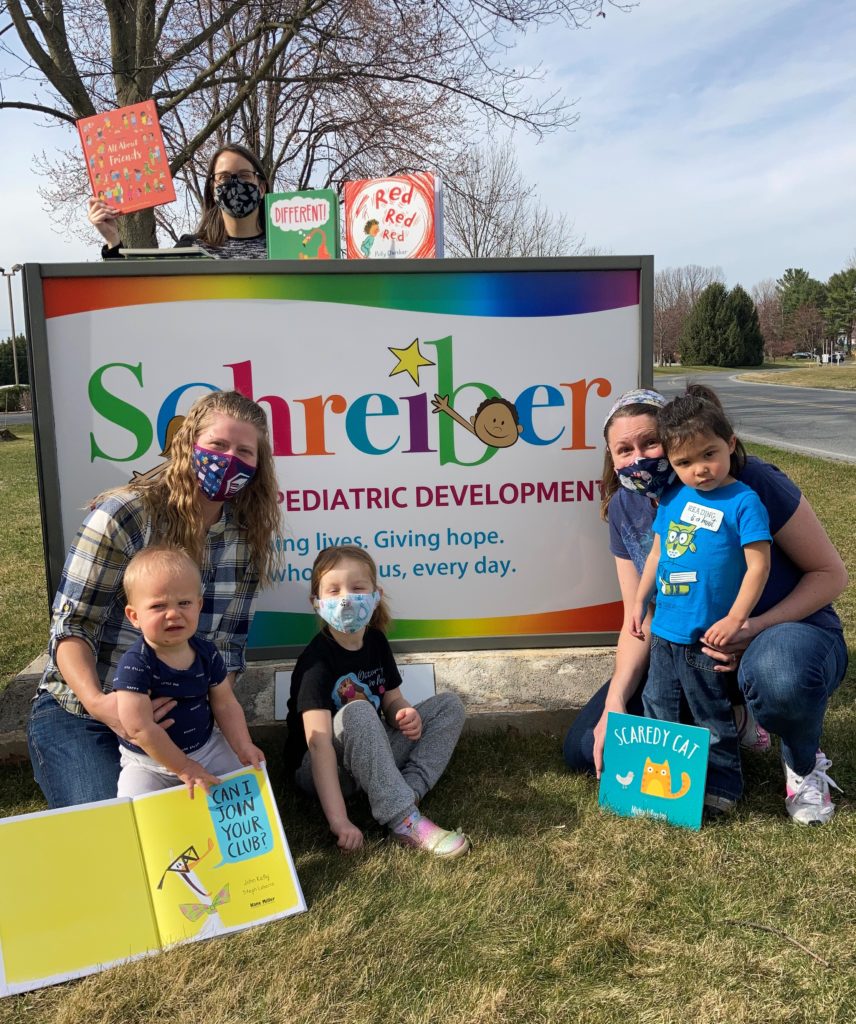
Michelle Miller, left, and Jennel Roberts recently visited Schreiber with their S.T.A.R.S. preschoolers to deliver $780 in donated Usborne books to Schreiber.
Jennel wanted to host a party to invite guests to come and buy books. And she wanted to add a charitable spin. People could either shop for themselves, and Usborne would match 50 percent of sales with donated books. Or book shoppers could make a direct donation, which Michelle then used to buy more books.
The result: The friends delivered four boxes of books, worth a total of $780, that are now being used in Schreiber’s therapy and preschool programs. The gift arrived in plenty of time for the April 23’s World Book Day, a global celebration of authors, books and reading.
Michelle is a two-time S.T.A.R.S. mom. Her daughter Amy is a preschool grad, and a younger daughter Adrienne is currently enrolled.
“I’m a TSS (therapeutic support staff), and my client received services from Schreiber,” Michelle said, balancing her youngest, 1-year-old Tommy, on her lap. “We love Schreiber, and the preschool being inclusional was important to us.”
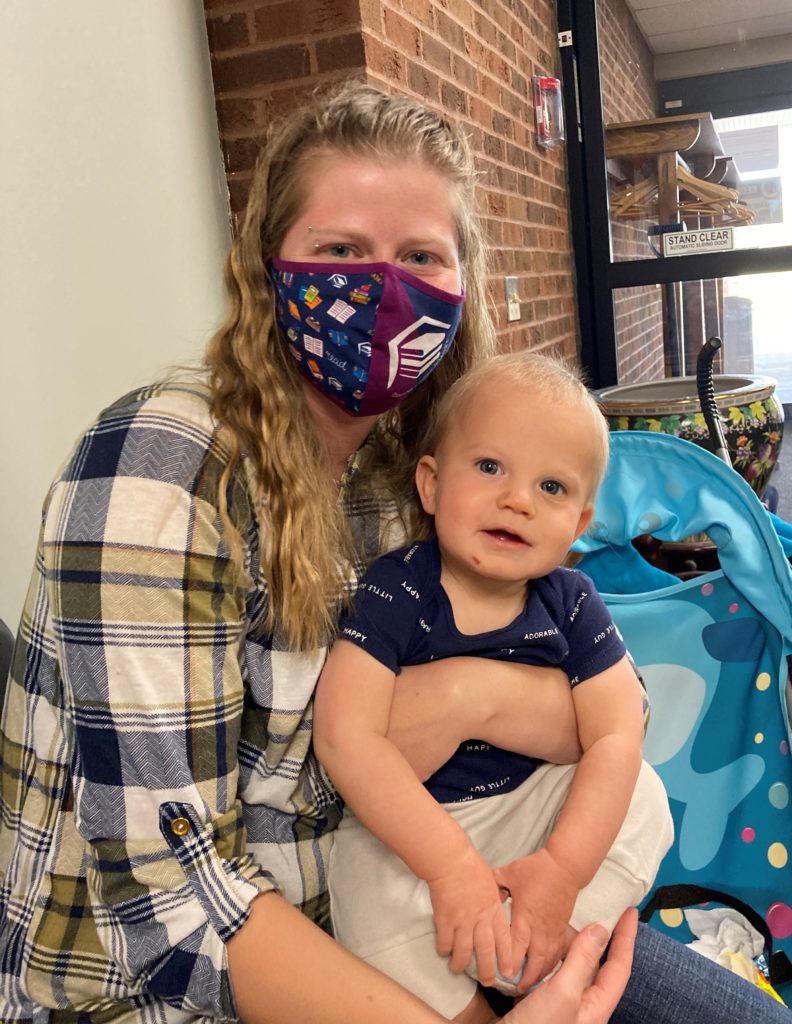
Schreiber’s inclusional or reverse mainstream philosophy places preschoolers with special needs in the same classroom as their typically developing peers.
“I wanted my kids to be around kids who were different from them,” she said. “I want them to learn to be an advocate and a voice for those kids in elementary school.”
Michelle has been an Usborne independent contractor for five years. You can find her online sales page here. She has an ongoing promotion now where once she reaches $250 in order, 50 percent of the retail total is donated to Schreiber as free books.
She also runs regular reading and literacy challenges for parents who follow her on Facebook. You can ask to join the group here.
“These are great books for all ages, even some for young adults,” Michelle said. “The philosophy of the company is to not talk down to kids, to treat them as inquisitive and create engaging, interactive books.”
Building inquisitive, engaged readers at Schreiber. We can’t think of a better way to celebrate World Book Day.
Circle of Friends rated STAR 4 again
April 13, 2021Schreiber’s Circle of Friends Academy child care program again received a STAR 4 rating from Pennsylvania’s Keystone STARS program, the highest rating possible under the state’s child care ratings. It’s the eighth straight year for Schreiber to receive the rating, which is intended to help parents and guardians compare the quality of different child care programs.
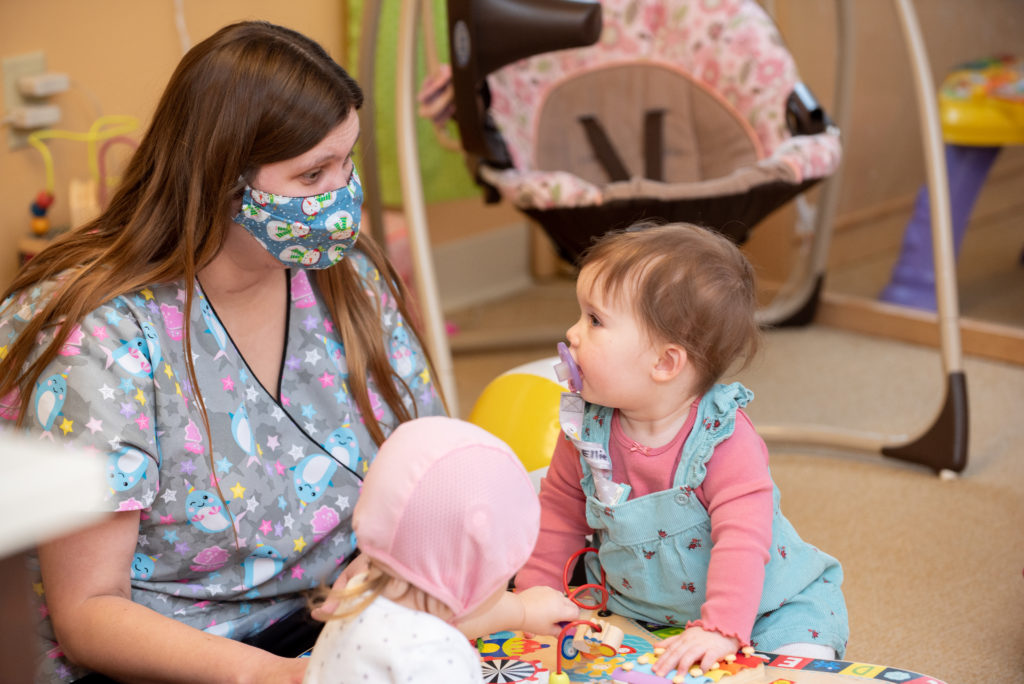
The state evaluates early learning programs in four key areas: staff education, learning environment, leadership/management and family/community partnerships.
“The STAR 4 rating tells us and the community the state believes we’re doing things right,” said Christina Kalyan, child care director at Circle of Friends. “We’re different from most Lancaster child care centers because we have kids with special needs next to their typically developing friends. And for those kids who need therapy or early intervention services, our therapists can do that while the kids are here during the day.”
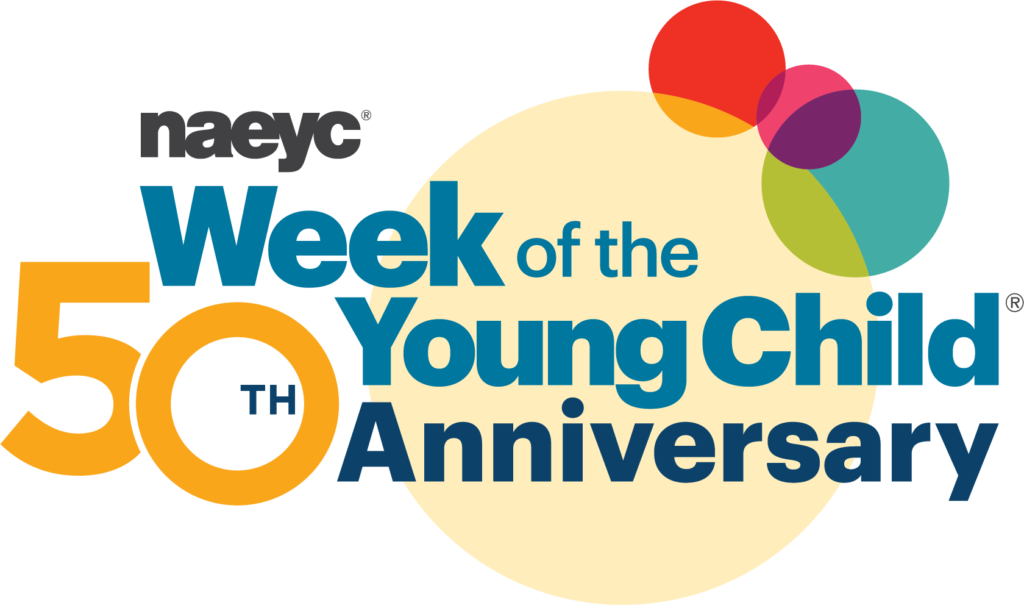
News of the rating coincides with the start of two programs that celebrate the importance of high-quality early education in April. Pennsylvania’s Promise for Children (PA Promise) offers the Month of the Young Child, which focuses public attention on the needs of young children and their families and recognizes the early childhood programs and services that meet those needs. The National Association for the Education of Young Children (NAEYC) is organizing its 50th anniversary Week of the Young Child April 10-16 to celebrate early learning, young children, their teachers, families and communities.
Circle of Friends has special instruction planned throughout the month, including lessons on dinosaurs, kites and wind and social skills activities that teach the value of diversity.
Schreiber’s child care center, S.T.A.R.S. Preschool and array of therapy services helps children of all abilities reach their fullest potential.
Schreiber marks Women’s History Month
March 31, 2021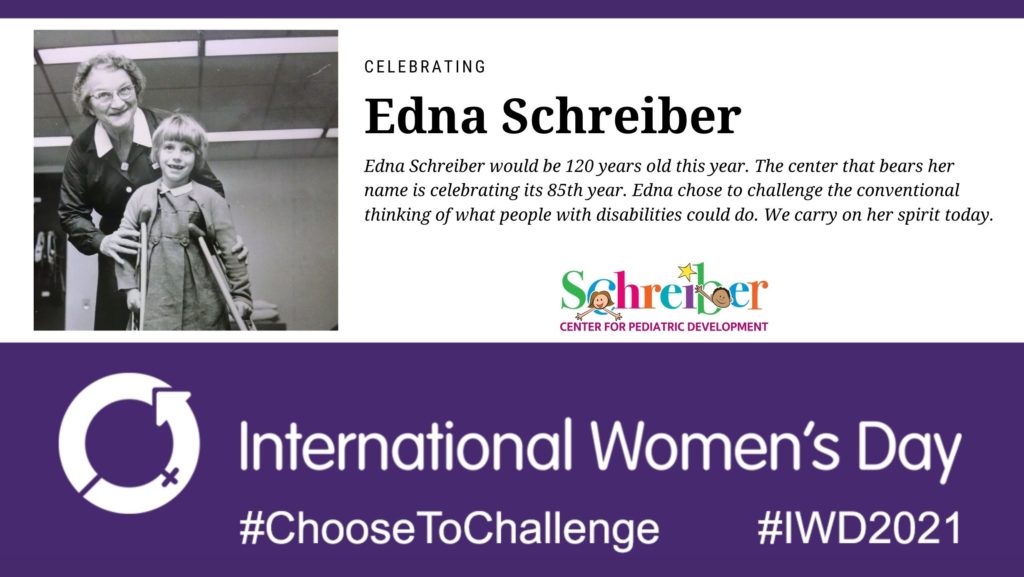
March was Women’s History Month, and we have been noting throughout the month on social media the enormous contributions that women have made throughout Schreiber’s 85 years. In fact, Schreiber’s story starts with a woman, Edna Schreiber. We trace our roots back to the organization she started here in Lancaster County in 1936. So we thought it was fitting to begin our celebration with a note about Edna on March 8, which was International Women’s Day.
Since then, we have been highlighting several women at Schreiber today, therapists, educators and others who are continuing the work that Edna started all those years ago, work that remains critical to families here in Lancaster and across all of central Pennsylvania.
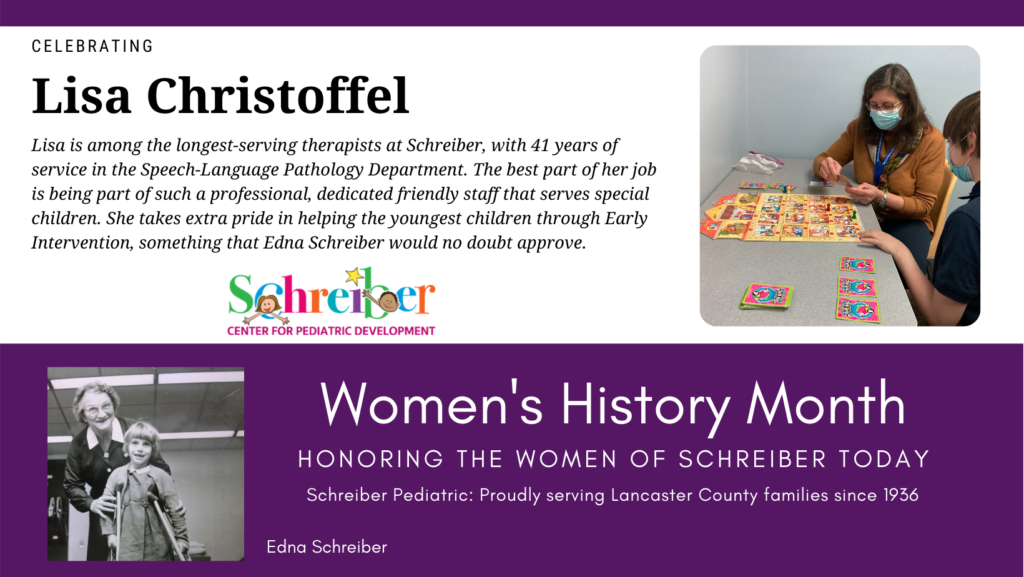
In Edna’s spirit: Service
Service at Schreiber: 41 years
Department: Speech-Language Pathology
Best part of your job today: Being a part of such a professional dedicated and friendly staff serving special children and families in the community.
One accomplishment you take extra pride in: Serving many families through Early Intervention over the many years.
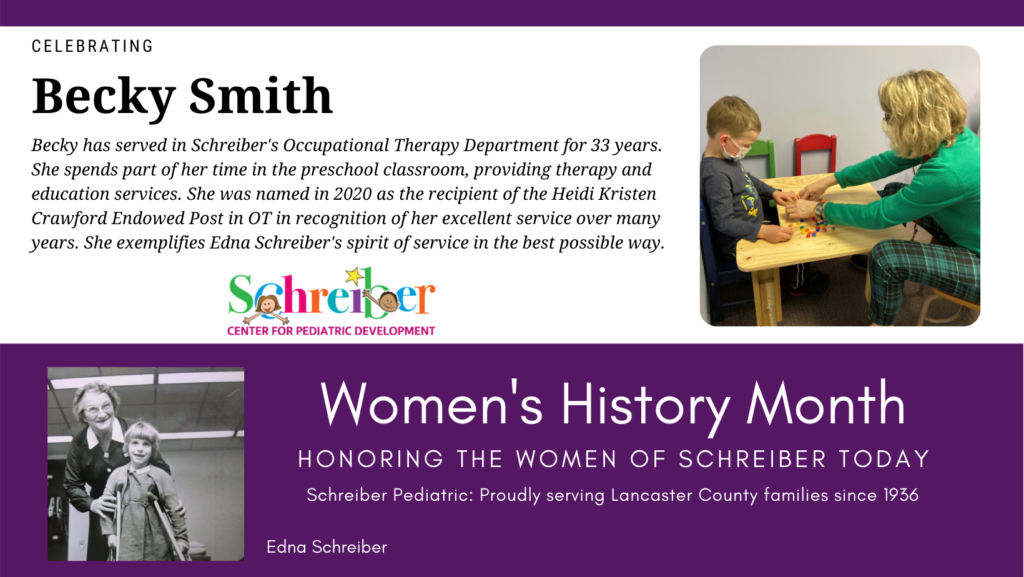
In Edna’s spirit: Growth
Service at Schreiber: 33 years
Department: Occupational Therapy
Best part of your job today: Working as the OT in the STARS Preschool as part of the team that provides education and therapy services for the children in those classes.
One accomplishment you take extra pride in: One past preschooler that I provided OT services to is now a young adult. She uses her creativity and love for her community to create painted artwork and crafts to sell during the pandemic. She gives 50 percent of her sales to local charities, with Schreiber being the first organization she contributed to. That’s what it’s all about. It comes full circle when the children you invest in, use their skills that they worked on in therapy to become productive members of the community and turn around and invest in others.
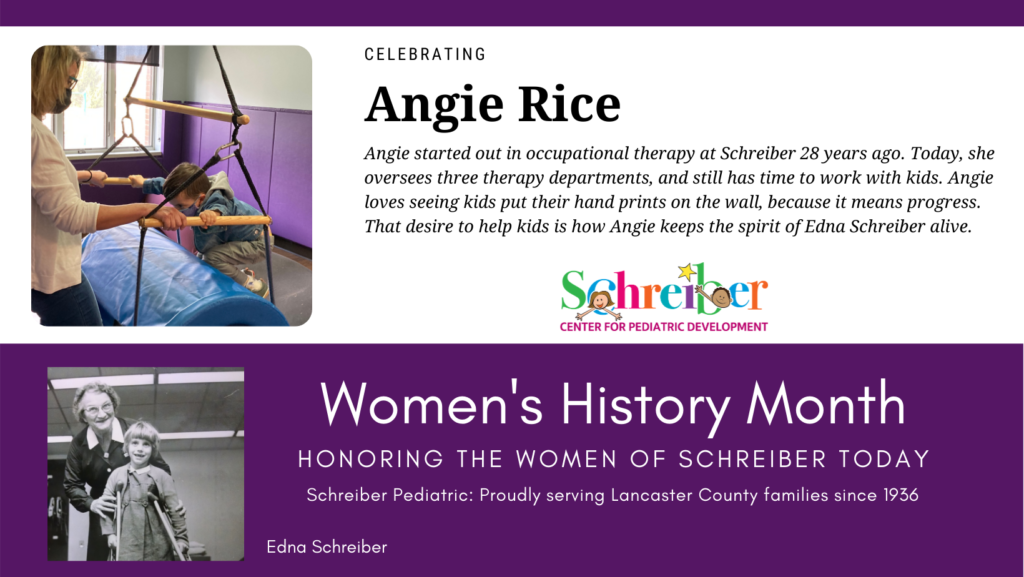
In Edna’s spirit: Dedication
Service at Schreiber: 28 years
Department: Occupational Therapy
Best part of your job today: Seeing the kids put their hand prints up on the wall, because it shows their progress.
One accomplishment you take extra pride in: That the families and kids put their trust in me and allow me to become a part of their lives and see these kids achieve their goals.

In Edna’s spirit: Commitment
Service at Schreiber: 27 years
Department: Physical Therapy
Best part of your job today: Working with children to help them achieve their best physical potential.
One accomplishment you take extra pride in: Helping a teen develop her goals and work towards them. Watching this same teen overcome so many obstacles to walk across the stage at her college graduation. Seeing this same young women as a wife, mother and businesswoman in our community.
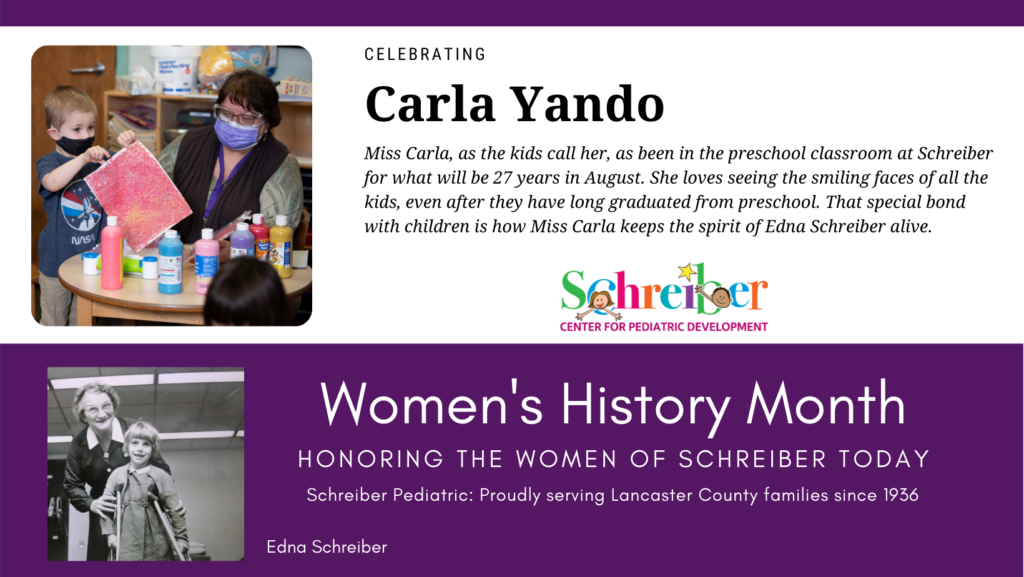
In Edna’s spirit: Connection
Service at Schreiber: 27 years
Department: S.T.A.R.S. Preschool
Best part of your job today: Working with Jay (Graver) and seeing smiling faces! And continuing to see them long after they graduate from preschool!
One accomplishment you take extra pride in: Introducing my daughter-in-law to my son all because of Club 625! Lisa Gilbert and I started Teen Scene many years ago, and it later developed into Club 625 as our teens grew older! I never would have guessed when Teen Scene started that I would end up with a “daughter” out of that awesome program!
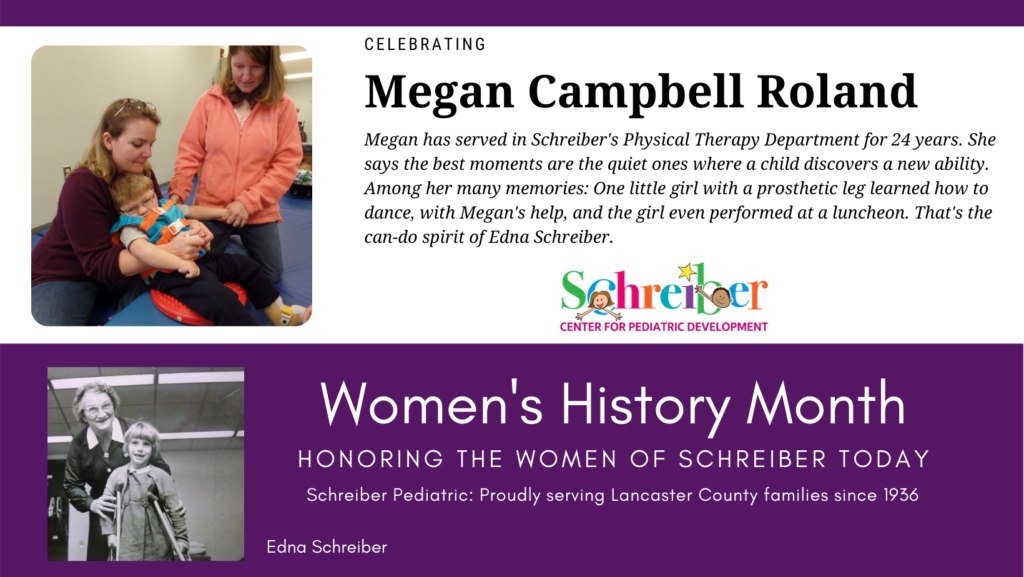
In Edna’s spirit: Discovery
Service at Schreiber: 24 years
Department: Physical therapy
Best part of your job today: The kids and their families and helping them grow.
One accomplishment you take extra pride in: I have so many happy memories it is is hard to pick one. One memory is of a little girl I saw who had a prosthetic leg who wanted to dance but was told she could not. I was a dance teacher but was not teaching at the time, so I got her hooked up with a friend of mine and former board member, Marilyn Beitel. Cystal was then going to perform for a luncheon, but Marilyn couldn’t help her rehearse, so I ran her rehearsals and got to see her perform. Amazing!
Another memory is of a kid who had no independent mobility but loved splashing in the pool. He was getting an above-ground pool from Make-a-Wish, and the family needed to find a floatation device so that mom didn’t have to hold him up the whole time. I took him in our pool and found not only a good floatation device, but discovered that this kiddo with no mobility could safely swim by himself with the right floatation.
The best memories are in the quiet moments when a child discovers something new they can do!
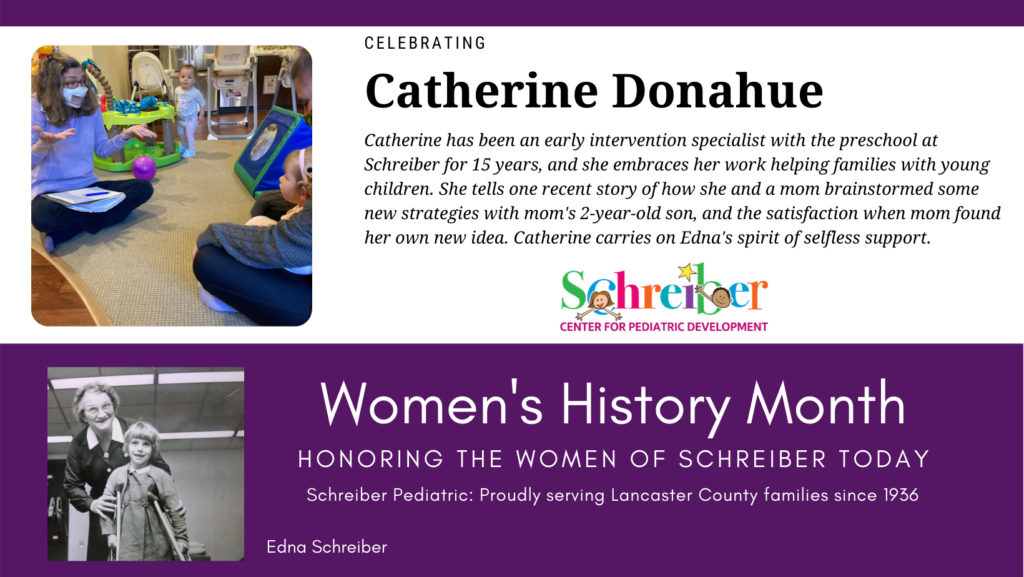
In Edna’s spirit: Passion
Service at Schreiber: 15 years
Department: Preschool
Best part of your job today: Having the opportunity to help the families of young children
One accomplishment you take extra pride in: Recently, in a tele-intervention session, a young mom was explaining to me why the strategies we had talked about didn’t work with her son. We spent some time talking about the challenges of 2 year olds, and especially of trying to raise a 2 year old while living in a hotel room. We spent some time talking about what she was doing right. We brainstormed solutions to some of her other concerns and I gave her educational ideas that she could do within her routines and with what she had. At the end of the session, she came up with her own excellent idea to make the strategy that she had started the session discouraged about, work for her and her son. She was excited to give it a try, but I think I was even more excited for her.
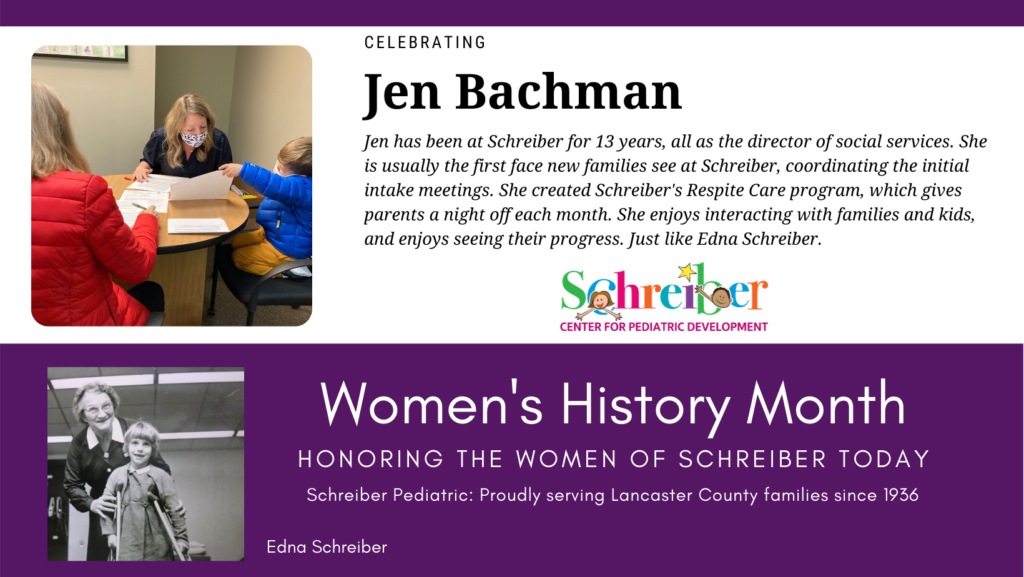
In Edna’s spirit: Advocacy
Service at Schreiber: 13 years
Department: Social services/Family Support
Best part of your job today: Interacting with the kids and their families and seeing their progress
One accomplishment you take extra pride in: I actually have two. Starting our Respite Program and advocating for the addition of the behavioral health department.